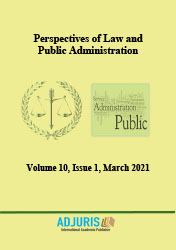RESTRICTION OF TESTAMENTARY FREEDOM. COMPARATIVE ASPECTS
RESTRICTION OF TESTAMENTARY FREEDOM. COMPARATIVE ASPECTS
Author(s): Egzone OsmanajSubject(s): Civil Law, EU-Legislation, Comparative Law
Published by: Societatea de Stiinte Juridice si Administrative
Keywords: inheritance; heir; will; testator; law;
Summary/Abstract: In this paper is analysed the restriction of testamentary freedom in a comparative aspect in some countries in the region and the EU. During the paper, the following research questions were asked: 1. What is the purpose of restricting testamentary freedom?; 2. What is the size of the necessary part, which testator no longer has the right to dispose a will or gift in favour of other persons, outside the circle of necessary heirs?; 3. How is the categorization of necessary heirs carried out according to the legislations of different states?; 4. How is the necessary part calculated?; and 5. How to act in cases when the necessary inherited part is violated? The paper is mainly based on the method of analysis of legislation and the comparative method. From the analysis of laws in the countries under study, several conclusions found in this paper are: In Kosovo and the countries of the former Yugoslavia, as necessary heirs are considered: the children of the testator most of their descendants; conciliatory spouse; parents; brothers and sisters and grandparents of the testator. Whilst, in most EU countries, the circle of necessary legal heirs is much narrower, namely the tendency of contemporary legislation is to limit the circle of relatives of the testator, as necessary heirs.
Journal: Perspectives of Law and Public Administration
- Issue Year: 10/2021
- Issue No: 1
- Page Range: 95-101
- Page Count: 7
- Language: English

